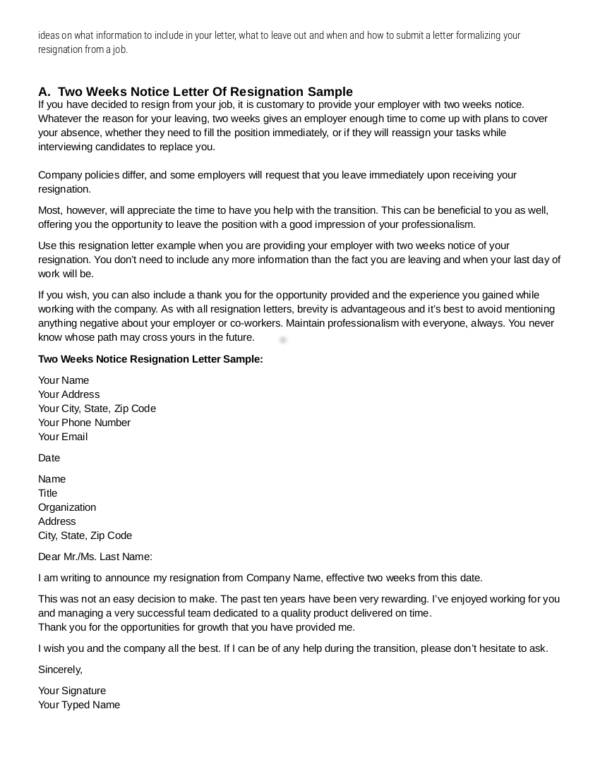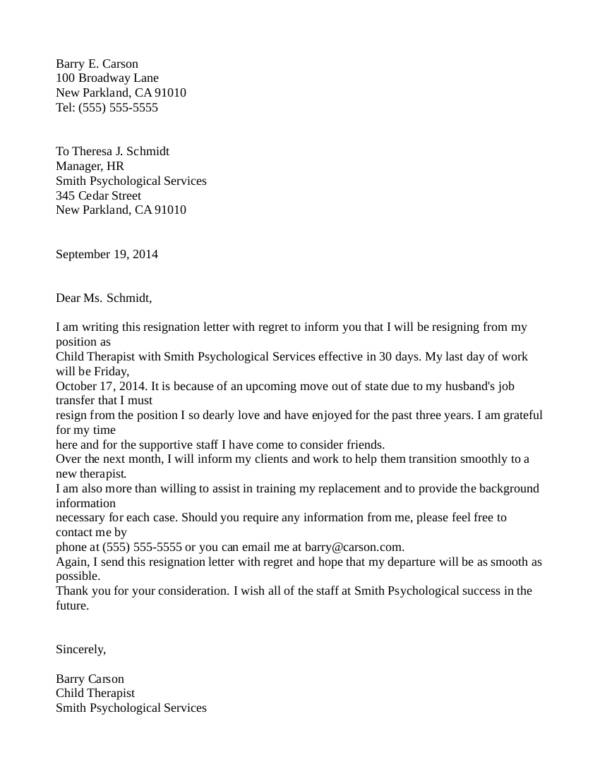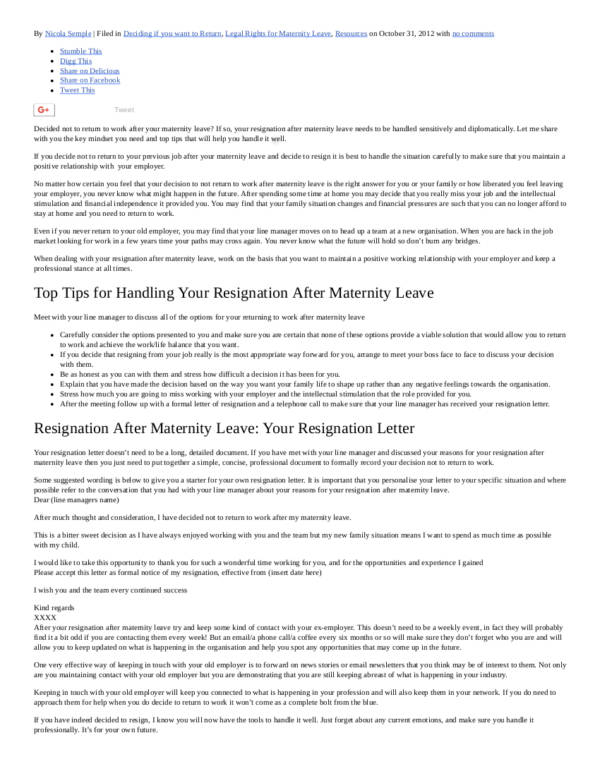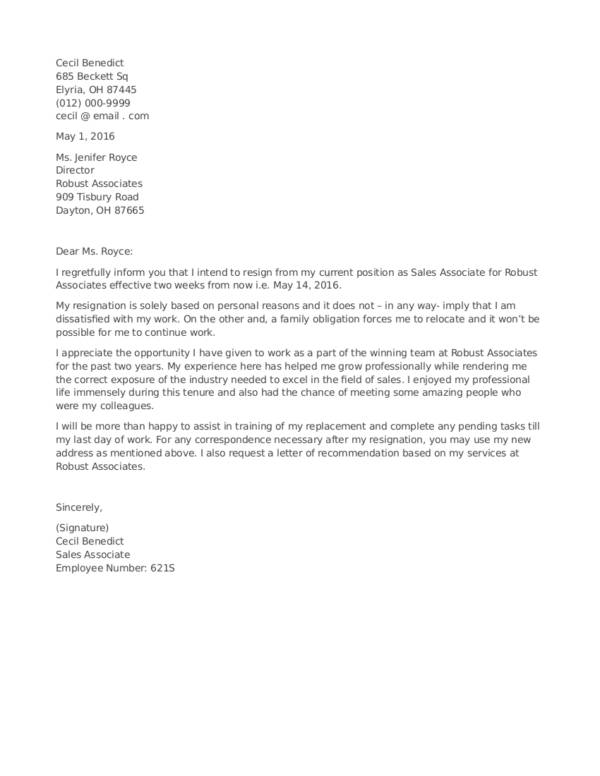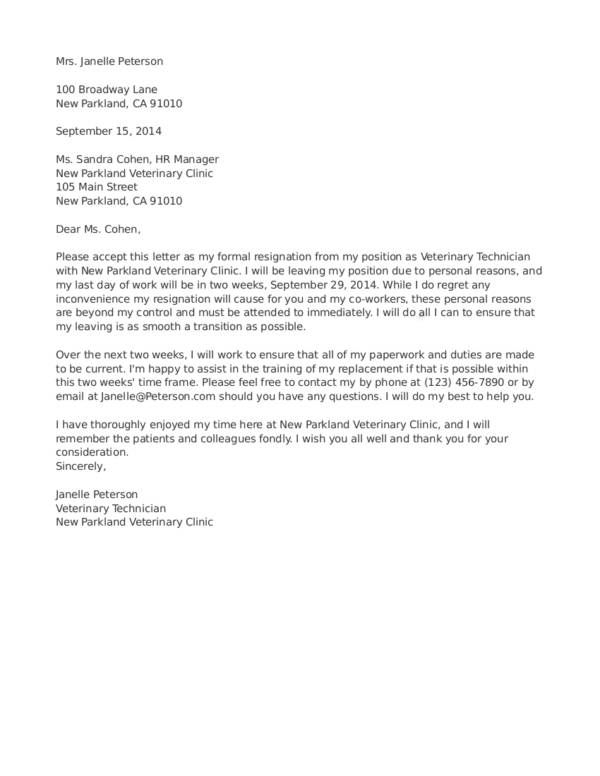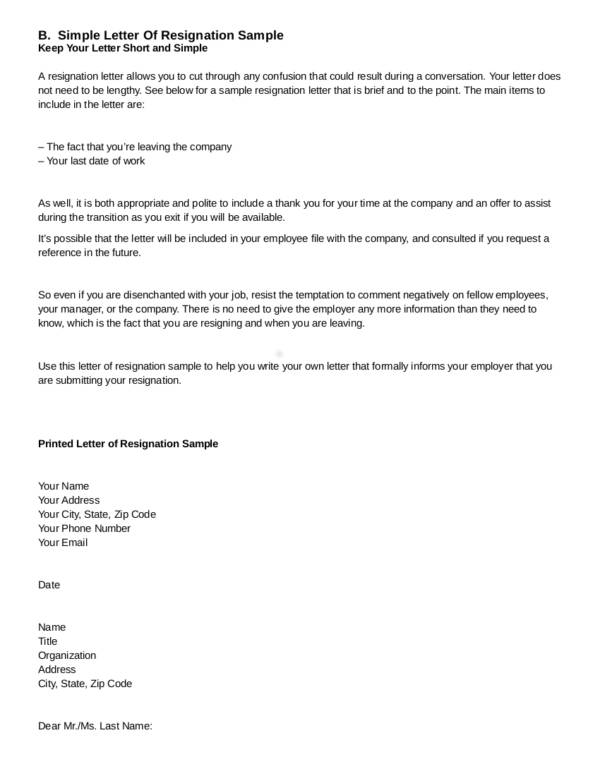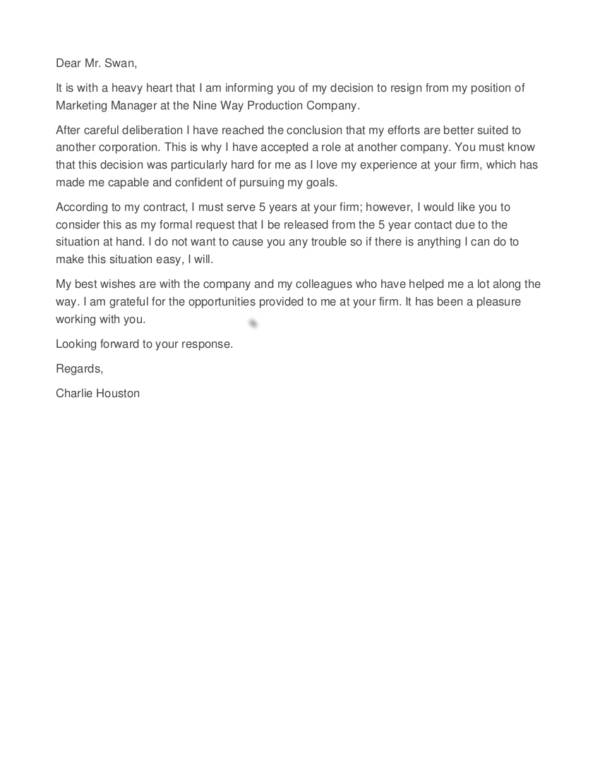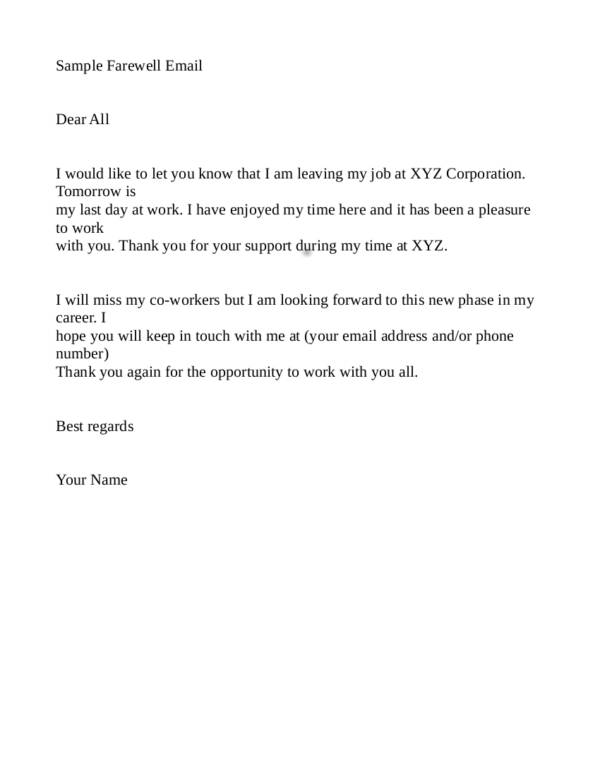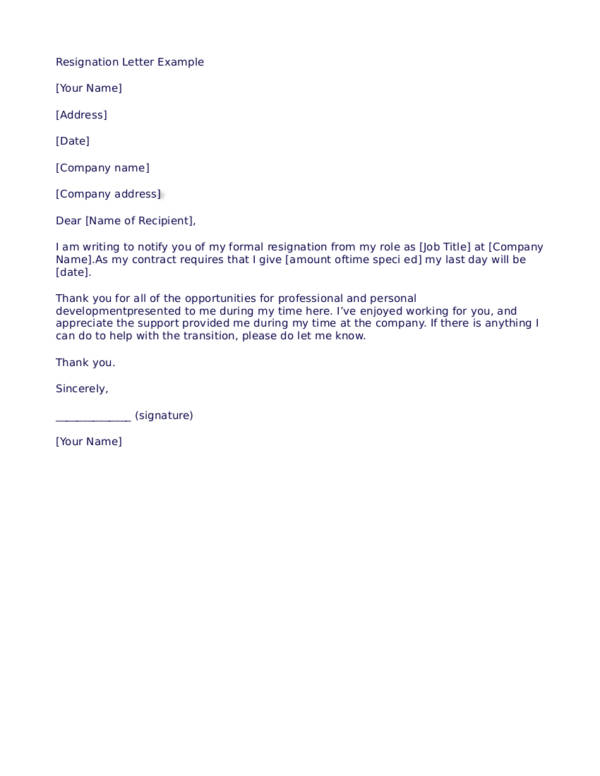Are you tired of the insufficient income you are making in your current job? Perhaps you are dissatisfied with the way things are being run at your company, or, worse, you find the company’s rules and expectations oppressive or disproportionate to the level of income and career growth you are obtaining? If you are experiencing any of these things, then perhaps it is time for you to resign. Whatever job position you may be planning on resigning from, you have to observe the appropriate rules of resignation. One such rule is to put your resignation in writing.
The submission of a resignation letter is an essential step in the resignation process. No matter how tiresome this task may seem, you have to do this for several reasons, which would be discussed in more detail in this article. Should you need any help in writing your resignation letter, then we got the right templates for you! Our collection of resignation letter templates is diverse enough that each one of these templates is designed to cater to a specific type of resignation. Lastly, these templates are easy to edit and download. So what are you waiting for? Scroll down below and download the ones that suit your needs!
Two-Week Notice Resignation Letter
Resignation Letter with Regret
Resignation Letter after Maternity Leave
Resignation Letter Due to Family Reasons
Steps to Take before Submitting a Resignation Letter
Writing a resignation letter can be a daunting task. Understandably so since this is your source of employment that you are seeking to end—you must be careful of the kind of resignation letter you will submit to your superiors. Now don’t be in such a hurry in scribbling a line or two in order to pass a resignation letter for mere formality. Here are some helpful steps you need to follow in order to remain professional in your dealings with your employer during resignation:
1. Know the reason behind your resignation.
You must know by now that the corporate world is a tough one. In order for you to wade through job applications a lot more easily, you must be able to present a resume that displays good work ethics. Hiring managers tend to ask a lot of questions regarding your reason for resigning your previous job, especially when it is clear how often you are jumping from one job to another. That is why it is of paramount importance that whenever you are tempted to tender your resignation, you have to pause for a minute and consider the following factors:
- timing
- validity of reason for resignation
It is easy to spot the perfect moment when you should tender your resignation once you know the reason behind it. For instance, if you are resigning due to the insufficiency of your income in the company, then logically, the best time for you to tender your resignation is when you have received a more lucrative job offer from another company. Moreover, if you are resigning due to a grave medical condition, then the proper thing to do would be immediate resignation.
In order to determine whether or not the reason behind your resignation is considered as reasonable or valid, you have to do the following:
- Check the laws of the state concerning the proper reasons for resignation.
- More importantly, read the terms of your company’s rules and regulations pertaining to the grounds of employee resignation.
- Know the most common grounds for resignation that are considered as acceptable in the industry that you are in.
If this is your first job resignation, here are the most common grounds for job resignation:
- Low salary
- Work schedule
- Grave illness
- Post-maternity complications
- Family relocation
- Career change
- Lack of career growth opportunities
- Arbitrary rules
- Having workload that is disproportionate to the income obtained
2. Understand the importance of observing a proper notice period.
A notice period is the duration of time that spans between the moment when an employee has tendered his/her resignation and the moment when such resignation takes effect. In other words, it is the time that occurs between the time when the employee has told his/her superiors his/her intent to resign and the moment when he/she would no longer perform his/her tasks.
There are several reasons why you must observe a proper notice period. Some of those are the following:
- By observing a proper notice period, you will be able to retain a good relationship with your managers and employer even after your actual resignation. Hence, it can benefit you in the following manner:
- You can call on your previous manager or employer to write a recommendation letter on your behalf when you are applying for jobs in other companies.
- Your name won’t be tainted with the negative connotation that often comes with a resignation.
- You would be able to retain your good name as a worker with good work ethics and high level of professionalism.
- It allows your employer to look for another candidate who can fill in your position once you vacate it. Since they have the time to do so while you are still performing your job functions, then it helps them avoid the disruption of their business operations due to a lack of manpower.
- It gives you the chance to help your company one last time by mentoring the person who would replace you so that they can properly perform the functions of your position.
3. Set up a meeting with your supervisor or human resource manager.
You have to set up a meeting with your supervisor or any immediate head so that you may inform them regarding your intent to resign. There is a chance that they may make the proper adjustments in order to accommodate to your needs so that they may keep you in their employee list. Otherwise, it is always good to talk to your manager personally as this is a clear sign of professionality and you are showing your respect to the persons who have entrusted you with your position.
4. Download templates of resignation letters.
Now that you have made your supervisor aware of your intent to resign, you may then make preparations for your letter-writing. First, find out the proper format and content arrangement of a resignation letter. For this purpose, scour the Internet for resignation letter templates. If you wish, our website offers you easily downloadable collections of 2-week notice resignation letter, maternity resignation letter, resignation letter due to personal reasons, and other formal resignation letter templates.
Resignation Letter Due to Personal Reasons
Simple Letter of Resignation
Resignation Letter on a Short Notice
E-mail Resignation Letter
Formal Resignation Letter
How to Format Your Resignation Letter
The following guidelines below can help you in writing your resignation letter:
- Write the return address, which contains the following information:
- your name;
- your job position in the company;
- your complete address; and
- your contact number or e-mail address.
- Leave one space below this heading then write the date when you are planning to send your letter.
- Leave one space, then write the information of your recipient:
- name
- job position title
- company name
- company address
- Leave two spaces then write the salutation.
- Address your manager or employer respectfully. For example, you could write “Dear Mr. Jones” or “Dear Mrs. Brown.”
- In the body of your letter, start with a formal greeting. You may simply write, “Good day!” or “Good morning!”
- Then state briefly your intention to resign. Be straightforward when making your resignation statement. There really is no need for you to lighten the blow by engaging in maze-like and superfluous verbiage, which can only cause your recipient confusion and distress in trying to understand what your letter’s purpose is.
- Write the reason behind your resignation. You don’t have to go into detail if you don’t want to and especially if you have already talked about it to your manager.
- Specify the date when your resignation would take effect. This is where you observe the proper notice period that your company requires you to follow. Usually, a notice period is just two weeks long, so make sure that the date you specify in your letter is the date that is in accordance with the notice period.
- In your letter’s closing, thank your employer or manager for the opportunities that have bee made available to you in the company. You may narrate the skills you have acquired due to the nature of your tasks in the company.
- It is also advisable for you to offer your willingness to train the person who would fill in your position after you leave it during the two-week period before your actual resignation. You can express your willingness in the following manner:
- “I would like to offer my services in any way I can during the transition period.”
- “I promise to train the person who would fill in my job position after I leave it in the best way I can.”
- Close your letter with a polite remark. Examples of polite remarks that are commonly used are the following:
- “Best regards”
- “Yours truly”
- “Sincerely yours”
- “Warm regards”
- Write your signature above your complete name.
Now that you know the basics of writing resignation letters, go ahead and write your draft now! For more information, you may check our article that discusses the importance of keeping a polite tone in your resignation letter and other tips that you can follow. Simply click on the link provided.
Related Posts
Resignation Letter for Medical Samples & Templates
Letter of Intent Samples & Templates
Letter of Intent for a Job Samples & Templates
Lease Proposal Letter Samples & Templates
Letter of Inquiry Samples & Templates
Character Reference Letter Samples & Templates
Claims Letter Samples & Templates
Response Letter Sample & Templates
Follow Up Letter Samples & Templates
Sample Project Proposal Letter Templates
Donation Letter Samples & Templates
Addressing a Formal Letter Samples & Templates
Grievance Letter Samples & Templates
Sample Sponsor Thank You Letter Templates
Sample Letters of Request

